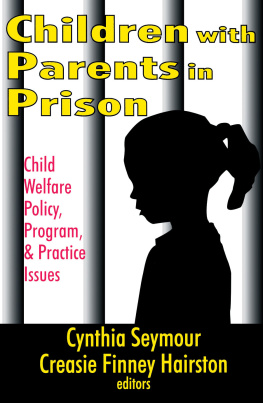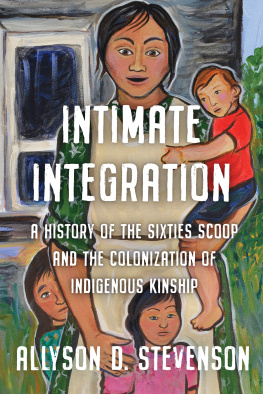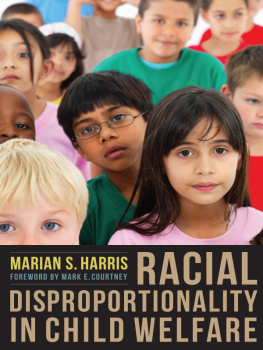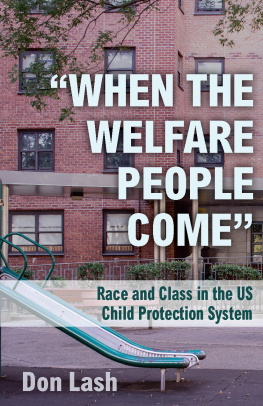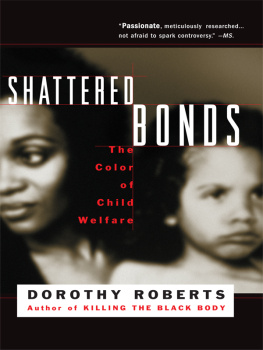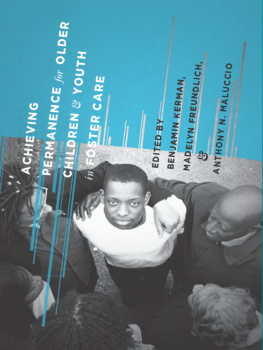Imagining
Child Welfare
in the Spirit of Reconciliation
Voices from the Prairies
Previous publications in the Voices from the Prairies series:
Putting a Human Face on Child Welfare (2007)
Passion for Action in Child and Family Services (2009)
Awakening the Spirit: Moving Forward in Child Welfare (2012)
Reinvesting in Families: Strengthening Child Welfare Practice for a Brighter Future (2014)
Transforming Child Welfare: Interdisciplinary Practices, Field Education, and Research (2016)
Imagining Child Welfare
in the Spirit of Reconciliation
Voices from the Prairies

edited by
Dorothy Badry, H. Monty Montgomery,
Daniel Kikulwe, Marlyn Bennett, and Don Fuchs

2018 University of Regina Press.
Imagining Child Welfare in the Spirit of Reconciliation may be downloaded free of charge from www. uofrpress.ca or may be reprinted or copied, in whole or in part, for educational, service, or research purposes without permission. For all other purposes, written permission to reprint or use is required. Requests for written permission should be sent to the publisher.
Every reasonable effort has been made to secure necessary permissions, but errors or omissions should be brought to the attention of Dorothy Badry at badry@ucalgary.ca.
Suggested Citation: Badry, D., Montgomery, H., Kikulwe, D., Bennett M., & Fuchs, D., (Eds.). (2018). Imagining Child Welfare in the Spirit of Reconciliation . Regina, sk : University of Regina Press.
Printed and bound in Canada by Marquis. The text of this book is printed on 100% post-consumer recycled paper with earth-friendly vegetable-based inks.
Cover Design: Duncan Campbell, University of Regina Press
Text Design: John van der Woude Designs
Copy Editor: Dallas Harrison
Proofreader: Kristine Douaud
Index: Patricia Furdek
Cover Art: Altered from the original by smartboy10 / stockphoto. Inspired by the promotional materials from the Imagining Child Welfare in the Spirit of Reconciliation conference.
Library and Archives Canada Cataloguing in Publication
Imagining child welfare in the spirit of reconciliation / edited by Dorothy Badry, H. Monty Montgomery, Daniel Kikulwe, Marlyn Bennett, and Don Fuchs.
(Voices from the prairies) Includes bibliographical references and indexes. Issued in print and electronic formats. isbn 978-0-88977-575-6 (softcover). isbn 978-0-88977-576-3 ( pdf ). isbn 978-0-88977-577-0 ( html )
1. Child welfarePrairie Provinces. 2. Kinship carePrairie Provinces. 3. Indian childrenCarePrairie Provinces. 4. Social work with childrenPrairie Provinces. 5. Social work with IndiansPrairie Provinces. 6. Social servicePrairie Provinces. 7. Indians of North AmericaKinshipPrairie Provinces. 8. ReconciliationSocial aspectsPrairie Provinces. 9. Prairie ProvincesSocial conditions. i . Badry, Dorothy Eleanor, 1958-, editor ii . Montgomery, H. Monty, 1962-, editor iii . Kikulwe, Daniel, editor iv . Bennett, Marlyn, 1963-, editor v . Fuchs, Don, 1948-, editor vi . Series: Voices from the prairies
hv 745. p 73 i 43 2018 362.709712 c 2018-903908-6 c 2018-903909-4
10 9 8 7 6 5 4 3 2 1

University of Regina Press, University of Regina
Regina, Saskatchewan, Canada, s4s 0a2
tel : (306) 585-4758 fax : (306) 585-4699
web : www.uofrpress.ca
We acknowledge the support of the Canada Council for the Arts for our publishing program. We acknowledge the financial support of the Government of Canada. / Nous reconnaissons lappui financier du gouvernement du Canada. This publication was made possible through Creative Saskatchewans Creative Industries Production Grant Program.

For the children. We dedicate this book to everyone involved with and striving toward a child welfare system that is caring and compassionate in the work of meeting the complex needs of children and families where child protection and family support are needed. The time for reconciliation and transformation has arrived.
Contents
Jeannine Carriere
Dorothy Badry
Don Fuchs
Part i : Policy
chapter 1: Daniel Kikulwe & Julie Mann-Johnson
chapter 2: Shelley Thomas Prokop, Laura Hicks, & Rachel Melymick
Part ii : Practice
chapter 3: Julie Mann-Johnson & Daniel Kikulwe
chapter 4: Anne Marie McLaughlin, Richard Enns, & Deena Seaward
chapter 5: Peter Choate & Gabrielle Lindstrom
chapter 6: Michelle Stewart, Lisa Lawley, Rachel Tambour, & Alexandra Johnson
Part iii : Research
chapter 7: Marlyn Bennett & Ainsley Krone
chapter 8: Bruce MacLaurin, Hee-Jeong Yoo, & Morgan DeMone
chapter 9: David Este & Christa Sato
chapter 10: Dorothy Badry, Christine Walsh, Meaghan Bell, & Kaylee Ramage
Part iv : Education
chapter 11: Cathy Rocke & Judy Hughes
chapter 12: Jennifer Hedges
H. Monty Montgomery
Foreword
Jeannine Carriere, Professor, School of Social Work,
University of Victoria
I begin this foreword by acknowledging the territory on which I have the privilege to live, work, and play. I live on Vancouver Island, and more specifically I am allowed to teach among the WSANEC (Saanich), Lkwungen (Songhees), and Wyomilth (Esquimalt) peoples of the Coast Salish Nation. My family and I live in the territory of the Cowichan Tribes near Duncan, bc , and every time I look out at the big cedars in my yard or hear the calling and chirping of eagles and ravens nearby I am grateful. I also wish to acknowledge my ancestors and the territory I come from. I am a Mtis woman, and I grew up in southern Manitoba in the territory of the Anishinabe, Cree, Assiniboine, and historic Mtis Nation. I acknowledge how my ancestors fought for our rights and the privileges we have today. I am also grateful for the experiences I had as a frontline social worker in Alberta. The Prairies will always be home. As I write this foreword, I also acknowledge the many Indigenous children who have died in the care of child welfare or other authorities. May they be at peace knowing that there are people who remember them, including those who contributed to this book, and I am honoured to be part of this work.
As I ponder over the title and chapters of this book, I cant help but rethink the whole concept of reconciliation and how we are all working to decolonize and reconcile. The we of course includes social work educators, administrators, and practitioners. It is enough to make my head spin most days; however, it is one of the most current and important discourses that we have before us as social workers and as people who live in Canada. How can we ignore the context that we have now come to, with our increased knowledge about the tragedies of residential schools, the impact of the Sixties Scoop or Indigenous child-removal system, and, for me as a Mtis academic, the harsh reality that Dr. Catherine Richardson and I connected with in our research on Mtis child welfare in 2017? Through our research, we discovered the lack of identification for Mtis children in care is very problematic and renders them the invisible children of child welfare.
Next page

